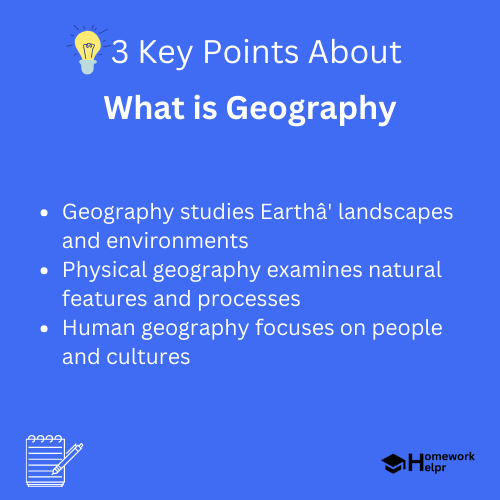📝 Summary
Geography is the study of the Earth’s landscapes, environments, and the interactions between people and their surroundings. It divides into physical geography, which examines natural features like landforms, weather, and ecosystems, and human geography, focusing on cultural, economic, and urban aspects. Understanding geography is crucial for numerous reasons, including managing natural resources, addressing global issues such as climate change, and developing valuable skills for various careers. By studying geography, we unlock insights into our world’s interconnectedness, facilitating better responses to challenges.
What is Geography?
Geography is the study of the Earth’s landscapes, environments, and the relationships between people and their environments. It examines how human activity affects and is affected by the Earth’s surface. Geography can be broadly divided into two main categories: physical geography and human geography.
Understanding geography is essential for numerous reasons, including planning cities, managing natural resources, and understanding global issues like climate change. Through geography, we explore the very fabric of our world, from the soaring mountains to the vast oceans.
Physical Geography
Physical geography explores natural features and processes of the Earth. This branch looks at things like landforms, weather, climate, and ecosystems. It delves into how these natural factors interact with human life.
- Landforms: These include mountains, valleys, plateaus, and deserts. Each of these landscapes has unique characteristics and influences on climate and biodiversity.
- Weather and Climate: Weather describes short-term atmospheric conditions while climate refers to long-term trends. Both play a significant role in shaping human activities and natural environments.
- Ecosystems: Ecosystems are communities of living organisms interacting with their environment. They can be terrestrial, like forests, or aquatic, like oceans. The health of these ecosystems is vital for biodiversity.

Human Geography
Human geography focuses on the study of people, cultures, economies, and their interaction with the environment. This branch of geography helps us understand how society influences the world around us.
- Cultural Geography: This examines the ways in which culture shapes places and regions. Landmarks, traditions, and spatial distributions are key components.
- Economic Geography: This area studies how economic activities are distributed and why certain areas are more affluent than others.
- Urban Geography: It focuses on cities and the processes of urbanization, examining how cities grow and change over time.
Definition
– Urbanization: The process by which rural areas become urban areas, typically involving the migration of people to cities for work and other opportunities.
Branches of Geography
Geography is quite a broad field with various branches. Aside from physical and human geography, there are several other specialized areas:
- Geographical Information Systems (GIS): This involves using technology to capture, manage, and analyze spatial data.
- Meteorology: The study of weather patterns and phenomena.
- Cartography: The science of map-making, which helps visualize geographical data effectively.
❓Did You Know?
Did you know the word “geography” comes from the Greek words “geo,” meaning Earth, and “graphy,” meaning writing? So, it literally means “writing about the Earth!”
Importance of Geography
The importance of geography cannot be overstated. It provides insights and tools to tackle real-world issues. Here are some of the critical reasons why geography matters:
- Environmental Awareness: Geography fosters a better understanding of environmental issues such as climate change, deforestation, and pollution.
- Cultural Appreciation: By studying geography, we learn about different cultures and their interactions, fostering empathy and understanding.
- Resource Management: Understanding geographical features aids in managing natural resources like water, minerals, and forests effectively.
Moreover, knowing where things are and how they relate to each other can be essential for everything from disaster management to urban planning. With the right geographical knowledge, communities can build resilience against natural hazards.
Geographic Skills
Studying geography equips students with several important skills that are essential in various fields:
- Critical Thinking: Analyzing geographical data promotes sharp analytical skills, enabling students to solve complex problems.
- Observation: Geographic studies encourage keen observation of surroundings, leading to deeper insights.
- Data Literacy: In today’s data-driven world, understanding how to interpret maps and data is a valuable skill.
Examples
For instance, when learning about climate change, students might analyze maps showing how different regions are affected, enhancing their understanding of the global implications.
Careers in Geography
Studying geography also opens up various career opportunities in both public and private sectors. Here are some potential careers:
- Urban Planner: Professionals who help design and develop city layouts, focusing on sustainability.
- Cartographer: Individuals who create maps to assist in geographical understanding.
- Environmental Consultant: Experts who assess environmental impacts and work towards sustainability.
Definition
– Cartographer: A person who creates maps, using various techniques to represent geographical data accurately.
Conclusion
In summary, geography is an essential field that helps us understand our planet and the complex interactions within it. It encompasses various sub-disciplines that cater to both natural and human elements. By studying geography, we gain insights into how to manage our resources, appreciate cultural diversity, and prepare for challenges like climate change. Mastering geography equips students with significant skills and knowledge that can lead to exciting career opportunities. So, whether you’re looking at mountains, rivers, or urban landscapes, remember that everything is interconnected in this vast world of geography!
Related Questions on What is Geography
What are the two main categories of geography?
Answer: Physical geography and human geography.
Why is geography important?
Answer: It helps manage resources and understand global issues.
What skills does studying geography provide?
Answer: Critical thinking, observation, and data literacy.
What careers can you pursue with a geography degree?
Answer: Urban planner, cartographer, and environmental consultant.
